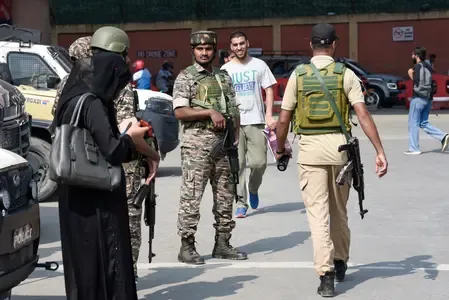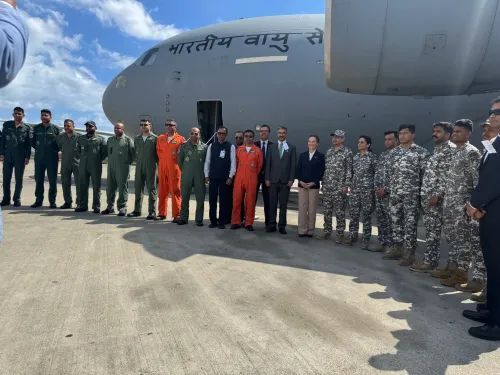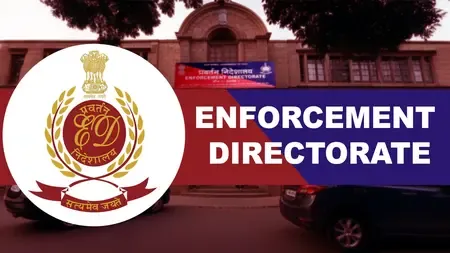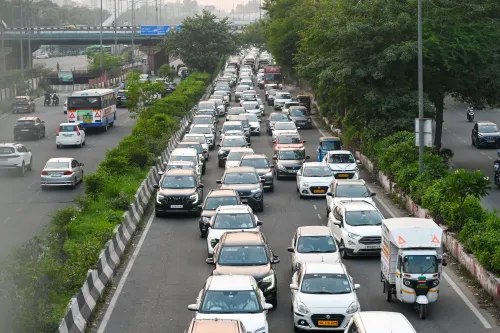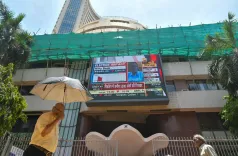Is President Trump’s Unpredictability Affecting US-India Relations?
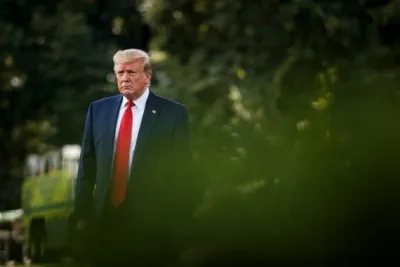
Synopsis
Key Takeaways
- Trump's unpredictability has raised questions about US-India relations.
- The ‘America First’ doctrine influences diplomatic dynamics.
- India seeks to maintain a strategic partnership with the US.
- Trump's immigration policies affect Indian talent.
- Sino-Pak collusion poses a security threat to India.
New Delhi: President Donald Trump, upon his bid for a second term, has been cultivating a reputation for ‘unpredictability’ and even ‘arbitrariness’ by enacting numerous Executive Directives, many of which are facing legal challenges and generating negative reactions from the global community.
India firmly believes that the relationship between India and the US is founded on a natural strategic alliance, emphasizing that the two largest democracies must unify to confront the serious threats posed by faith-based terrorism and the actions of authoritarian regimes like China. Any trade imbalances impacting both nations should be resolved through diplomatic negotiations.
As a prominent power, India must consistently assess how Trump’s policies affect bilateral relations, but it should not be influenced by criticism from domestic or international observers regarding Trump’s actions. Prime Minister Modi has effectively adopted this perspective, recognizing the mutual need between the US and India.
No country should harbor significant reservations about President Trump’s proclaimed doctrine of ‘America First’ and its implications for diplomacy and trade, as well as the US’s involvement in ongoing military conflicts globally. Two notable aspects of Trump’s readiness to issue Executive Directives merit attention: his willingness to face judicial review of his decisions, a hallmark of democracy, and his acceptance of the need to ‘course correct’ when necessary.
Trump’s strong focus on the economic growth of the US stems from his astute observation that America’s primary rival, Communist China, has learned from the downfall of the USSR and has deliberately opted for an economic strategy to emerge as the second superpower, while the American economy has faced challenges relating to trade deficits.
Consequently, Trump has prioritized the cost-effectiveness of federal administration, implementing layoffs where applicable, reducing funding for projects that do not provide direct benefits to the US, and aiming to restore manufacturing and sources of employment within America.
A new agency, the Department of Government Efficiency (DOGE), led by Elon Musk, a close advisor to Trump, is spearheading efforts to downsize federal agencies, uncover systemic corruption, and reorganize various sectors of the federal government.
Efficiency and cost-effectiveness are intertwined as the workforce should be minimized to an optimal level, and tasks should be executed timely and efficiently. Following Trump’s mandate of providing ‘minimum government maximum governance’, PM Modi has aligned India with this objective. Musk has implemented significant layoffs and reorganizations within many federal departments.
On March 20, Trump issued a Presidential order to dismantle the Department of Education, deeming it ‘wasteful and tainted by liberal ideology’.
Federal actions were initiated against Columbia, Harvard, and Princeton universities for allowing anti-Semitic activities on their campuses.
The Department of Health and Human Services (DHH) was restructured, reducing its divisions from 28 to 15 through internal mergers, resulting in a 25% workforce cut of 82,000 employees, yielding annual savings of $1.8 billion.
Meanwhile, DOGE uncovered significant bureaucratic corruption, revealing that 12.3 million individuals aged 120 years or older remained on social security records, leading to their immediate removal.
Another serious bureaucratic irregularity was exposed when the Food Safety and Inspection Services (FSIS) found that thousands of pounds of ready-to-eat frozen chicken products were sold without inspection by a New Jersey-based Brazilian company, Snack Mania, prompting a recall due to potential health risks.
It appears that Trump’s initiatives are primarily economically driven, albeit with a noticeable ideological slant towards the extreme right.
A controversial move by Trump was the declaration of a ‘national emergency’ to expel illegal immigrants from the US, allowing military deployment to secure the southern border and enabling Homeland Security to form statewide teams to identify such individuals. Restrictions on H1 Visas were implemented, birthright citizenship was abolished, and a heightened sense of discrimination against outsiders emerged, raising concerns in India, where top talent often seeks education and employment in the US.
In a press conference, Trump clarified his stance, stating that he did not intend to obstruct American companies from hiring ‘engineers on merit’, but aimed to prevent ordinary jobs from being filled by a cheaper foreign workforce for corporate profit.
India has shown a commendable understanding of US concerns regarding illegal migration, with PM Modi assuring Trump of India’s cooperation in dismantling the fraudulent ecosystem of illegal migration to the US.
Currently, India faces no major issues regarding US visas, apart from heightened scrutiny of applicants, which was anticipated.
While Trump was the first world leader to unequivocally condemn the terrorist violence in Pahalgam on April 22, some uncertainties arose in India about American responses to subsequent events related to the retaliatory military actions taken by the Modi administration against Pakistan.
Following a meeting of the Cabinet Committee on Security (CCS), PM Modi announced that the Defence Forces were authorized to act against terrorists and their supporters at their discretion.
When the Indian Air Force conducted multiple strikes akin to the Balakote operations on nine terrorist camps beyond the Line of Control and within Pakistan on May 7, an element of surprise was maintained. Aptly named Operation Sindoor, the Indian response thwarted Pakistan’s unsuccessful attempts to launch drone strikes near the Indian border. The drones, reportedly supplied by Turkey, were mostly intercepted by Indian air defense systems.
In retaliation, India launched missile strikes that inflicted severe damage on several prominent airbases in Pakistan. In a desperate move, the Pakistan Army reached out to the Trump Administration, reminding them of the nuclear capabilities of both nations, prompting Trump and his officials to suggest the idea of a ceasefire.
The ceasefire request originated from DGMO Pakistan, and India accepted it, with PM Modi articulating India’s future stance in a national address on May 12.
In what can be seen as a declaration of India’s National Security Policy, Modi stated that any future terrorist attacks from Pakistan would be treated as acts of war, with appropriate responses from Indian defense forces. He reassured that India would remain undeterred by any nuclear threats from Pakistan and emphasized that discussions with Pakistan would solely focus on cross-border terrorism and the return of PoK to India, adhering to the principle that ‘talks and terror do not coexist’.
It is likely that Trump did not wish to completely sever ties with Pakistan, viewing it as a trading partner, but he also aimed to protect the strategic India-US alliance.
Trump’s inclination to be somewhat hyperbolic surfaced as he claimed credit for preventing a ‘war’ between India and Pakistan and averting the loss of ‘millions of lives’. He offered to mediate between the two nations regarding Kashmir, but after observing India’s strong opposition to third-party involvement in Kashmir, he quickly adjusted his stance, stating on May 16 that India and Pakistan should engage in direct dialogue on the matter.
Maintaining the crucial friendship with the US appears manageable for India, despite the ‘unpredictability’ associated with President Trump and the evident trait of ‘vainglory’ that the world perceives in him.
A significant aspect of India’s strategic diplomacy will involve highlighting the collusion between Sino-Pak during the military confrontations that followed the events in Pahalgam.
(The writer is a former Director of the Intelligence Bureau)

